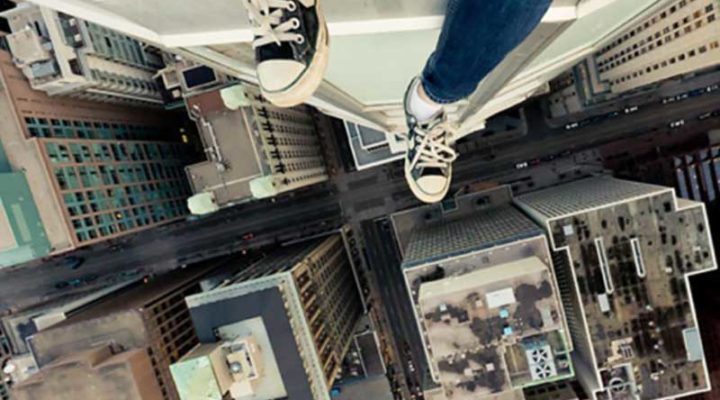
Do you have sweaty hands when you realize that you are high above the ground? Do you fear the thought of being elevated?
Does the thought of simply standing on a ladder scare you? If so, you have acrophobia.
Acrophobia is the name for a fear of heights. People with fear of heights don’t enjoy anything that involvesheights, whether Ferris wheel rides, roller coaster rides and or any fairground rides. People also have difficulty in standing on a high hill and some also dread being on an escalator. The person will start avoiding any situation that involves altitudes. And, its avoidance can interfere with someone’s life and can hamper the quality of life.
Related Conditions With Acrophobia
Sometimes, acrophobia is confused with:
Vertigo:Vertigo is a medical condition that can lead to the sensation of dizziness and spinning, and it’s not the the same as fear of heights. Of course there are similarities in the experiences of both – the dreaded situation of looking down from a height can also lead to temporary spells of dizziness. Vertigo is of two types:
Peripheral Vertigo: It is caused by the problem in the areas of the vestibular nerve and the inner ear, which connect the brain and the inner ear.
Central Vertigo:This situation usually arises when there’s a glitch in the brain, especially in the cerebellum.
Bathmophobia:If someone dreads from the fear of slopes and stairs, it is referred to as bathmophobia. This type of phobia also relates to the acrophobia. However, in this, you will fear from the steep slopes, even if you don’t want to climb it.
Climacophobia: This fear is also related to the bathmophobia, except it occurs when you are climbing. Climacophobia causes symptoms that might resemble dizziness. While various things can cause this disorder, the major ones are the previous negative experiences like having difficulty in climbing, have fallen down a flight stairs and more.
Aerophobia:This fear relates to the fear of flying. In this, the sufferer suffers severe anxiety from flying and sometimes can’t bring themselves to get on a plane and misses a flight.
Symptoms Of Acrophobia
The response to acrophobia is similar to the response to other phobias. You might feel the symptoms of dizziness, however other symptoms are:
- Anxiety And Avoidance:If you are suffering from acrophobia, you will dread from the situation which makes you spend time at high places. For instance, you may worry about your hostel room being on the high floor, or you may put off home repairs because you fear from a ladder.
- Physical Symptoms:Some of the physical symptoms of acrophobia may include shaking, sweating, heart palpitations, crying, yelling and more. You also feel terrified or paralyzed and is unable to think.
- Emotional Symptoms: Emotional symptoms might include a sudden sense of panic attacks, which occur when you are at some height. In this, you will not be able to trust your senses. Some other reactions might include crawling on all fours, descending immediately, kneeling and lowering your body.
Other Symptoms
- Shaking
- Sweating
- Experiencing heart palpitations
- Severe panic attacks
- Headaches and dizziness
Causes Of Acrophobia:
Fear of heights often originates from natural fears of being injured or falling. Living with the pain, that has occurred because of you being falling from a high place can also contribute to the development of acrophobia. Like all other fears, acrophobia is also a hyper-reaction offering normal fear of the response.
What You Should Do If You Are Suffering From Acrophobia
More Knowledge:
Learn everything about the fear of heights therapy and educate yourself about it. Look for different treatment options to manage your fear of heights. Further, acrophobia is different from another phobias, because if you have a panic attack while being at height, you will feel unsafe. So, make sure you educate yourself and then get the right treatment.
Relax:
Meditation, yoga, deep breathing and progressive muscle relaxation can help you cope with stress and anxiety. However, regular exercise can help you treat the fear.
Get Support:
Take therapy, or talk with professionals. You can also seek help from your family, friends to help you.
Depending upon the severity of the situation, fears can be of any type. And there’s no shame in dealing with them. Just get the right treatment and treat it!
Leave a Reply